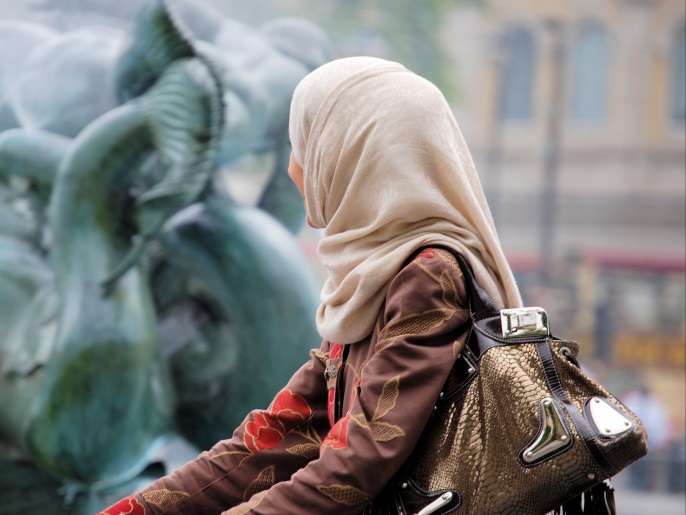In October 2020, French President Emmanuel Macron announced a new bill restricting the right of women to wear the Islamic headscarf in public. The law was ratified by the Senate and the Parliamentary National Committee last July, and it will enter into force soon.
The new law prohibits women accompanying their children on school trips from wearing the headscarf, veiled women from visiting their children inside school or nurseries, and from participating in a sporting event or competition hosted by a sports federation, in a context where the French Football Federation is the only international body banning veiled women. from participating in sports.
A public life is at stake
After the Senate ratification session, women launched the "handsoffmyhijab" campaign, supported by prominent Muslim women such as Ibtihaj Muhammad;
She is the first veiled US Olympic athlete, Somali-born model Rawda Mohamed, and US Congressman Ilhan Omar.
#HandsOffMyHijab – This is how Muslim women in France are battling a potential headscarf ban for girls under 18 years old.
pic.twitter.com/yciRTWBDwA
— Al Jazeera English (@AJEnglish) May 7, 2021
Notable violations
This was not the first time that French law and politicians violated the rights of Muslim women, but there are other violations, most notably:
While FIFA has allowed players to wear headscarves since 2014, news of the ban reached in recent months the French soccer team, which includes Muslim players, who reported being forced to choose between their passion and their religion.
These girls formed a group called "Les Hijabeuses", and decided to persevere.
Last May, the general head of the "Republic on the Move" (LREM) party - affiliated with French President Emmanuel Macron - withdrew the party's support for one of the party's candidates, Sarah Zamahi, after she wore the hijab in her election campaign poster, and politicians demanded the enactment of a law banning veiled women. from running for leadership positions.
France's politicians and media launched an attack on Maryam Pougetou, the elected president of the National Student Union at the Sorbonne University in 2018, after she appeared in her hijab on French television.
Some judged Maryam as a "non-feminist" because of her modest dress, and considered her election to desecrate universities, and the satirical magazine Charlie Hebdo featured a caricature of Mary with rough, monkey-like features.
Two years after that incident, members of a parliamentary inquiry into the consequences of the coronavirus refused to attend a hearing of youth representatives, due to the presence of Maryam, whom Interior Minister Gérard Collomb described as a separatist.
French-Muslim singer Maniel Ibtisam was forced to withdraw from TheVoice competition in April 2018 after a backlash from French people, dismayed by the vision of a French hijabi, who republished old social media posts.
In 2017, the director of a consulting firm dismissed his employee because he did not want to see her in the hijab, and argued before the Court of Cassation that the client had asked the employee to remove her hijab, and asked him to intervene to force her to take it off. He pointed out that the veil "annoyed" some of the company's clients, and indeed, the court did not rule in favor of the employee, noting that the company should take into account the diversity of customers and their beliefs, and respect them.
In 2016, a 16-year-old girl was not allowed into her high school, due to the length of her skirt, which her principal considered an offense within a public institution and a religious sign.
While the State Council did not rule on the “legitimacy” of wearing long skirts in high schools, this incident revealed a number of similar incidents, after the hashtag “I wear my skirts as I like” was launched.
In 2016, the Minister for Family, Children and Women's Rights, Lawrence Rossignol, attacked veiled women, calling them "slave-lovers like American negroes", and accused them of activism in political Islam.
After banning the headscarf at the university in 2015, a bill came out aimed at imposing a neutral appearance on nannies working in homes or nurseries. With religious neutrality, there are no visible religious signs, that is, no veil."
Young victims of the hijab fight
On March 15, 2004, French law passed a law prohibiting students in pre-university classes from attending their classes in public schools and universities if they wore clear religious symbols, such as a head covering, a scarf or a turban, and then prevented Jewish, Muslim and Sikh students from going to school, after Subject to disciplinary sessions and the threat of dismissal.
The law targeted Muslims, and caused the expulsion of dozens of minority children - mostly Muslim girls - in the first year of its implementation, and about 150 students chose to leave school voluntarily, and the numbers declined in the following three years.
Children expelled from school by law faced the stigma of being excluded from French society, and that their identities were the basis for depriving them of education, and the law also caused them to drop out of education, and there are only 60 private Islamic schools in France, unlike more than 8,000 Catholic schools , while France now has the largest number of Muslims in Europe, estimated at 4.7 million, and representing 7.5% of the French.
Islamic education became unavailable with the introduction of a law in 2018, which stipulated that private school directors and teachers must hold French citizenship, with the possibility of closing the rest of Islamic schools with the “anti-separatist” law, and given the poor economic reality of the majority of Muslims in France, private education becomes Impossible.

